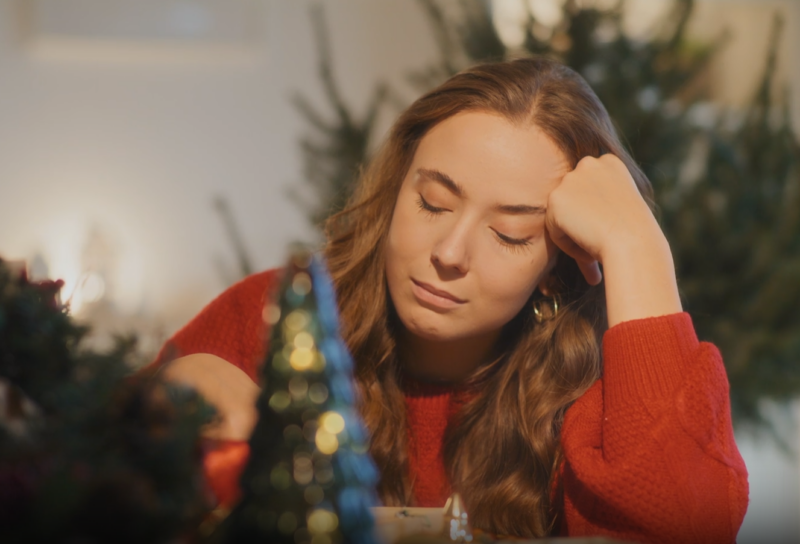The holiday season should be a symbol of joy and celebration, right? Well, paradoxically, it can be a period of emotional struggle for many.
This phenomenon, widely recognized as the “Holiday Blues,” presents a complex interplay of emotional challenges that contrast sharply with the festive atmosphere.
In this blog post, we’ll provide insights into its causes, symptoms, and coping strategies, all aimed at fostering a better understanding and aiding those who might be silently suffering.
Key Takeaways
- The Holiday Blues refers to a condition that is characterized by feelings of sadness, loneliness, and a lack of fulfillment, often occurring around Thanksgiving, Christmas, and New Year.
- The triggers are varied, including social isolation, grief and loss, financial pressure, unrealistic expectations, overindulgence, and family tensions.
- Key symptoms include feelings of sadness or despair, lack of interest in activities, irritability and mood swings, changes in appetite or sleep, and anxiety and stress. .
- Effective strategies to deal with Holiday Blues include setting realistic expectations, staying connected with others, budgeting wisely, honoring loved ones, prioritizing self-care, and seeking professional support when necessary.
What Does It Mean?
At its core, the Holiday Blues refers to a temporary feeling of anxiety or depression during the holidays. It’s important to differentiate this from clinical anxiety or depression, which are more severe and persistent.
Holiday Blues are characterized by a sense of sadness, loneliness, and a lack of fulfillment, often surfacing around the Thanksgiving, Christmas, and New Year periods.
Causes
The triggers for this temporary depression are diverse and multifaceted. They include:
1. Social Isolation

The emphasis on social gatherings during the holidays can intensify feelings of loneliness for those who are isolated.
This isolation can be particularly pronounced in individuals who have recently moved to a new city, are estranged from family, or lack a close circle of friends.
The contrast between personal experiences and the societal expectation of togetherness can deepen the sense of solitude.
Social media can exacerbate these feelings, as it often portrays an idealized version of holiday festivities that may not align with everyone’s reality.
2. Grief and Loss
Those mourning the loss of loved ones may find holidays particularly challenging. Holidays can act as poignant reminders of the absence of a cherished person, triggering profound sadness.
This period can reopen healing wounds, making it difficult to partake in celebrations that were once joyful. It’s also a time when the contrast between personal grief and general merriment can feel particularly stark.
3. Financial Pressure

The commercialization of holidays can lead to financial stress. The pressure to buy gifts, host events, or travel can strain personal budgets, leading to anxiety and stress.
This financial burden can be overwhelming, especially for those already managing tight finances.
It can also create a sense of inadequacy and embarrassment, particularly in cultures where there is a strong emphasis on material expressions of love and celebration.
4. Unrealistic Expectations
Idealized portrayals of holidays in media can create unattainable expectations, leading to disappointment. These portrayals often depict perfect families, lavish gifts, and flawless decorations, setting a high bar that is not always achievable.
The gap between reality and these idealized images can lead to feelings of inadequacy and frustration. Moreover, the pressure to create a perfect holiday experience can detract from the genuine joy of the season.
5. Overindulgence

Excessive eating, drinking, and partying can exacerbate feelings of guilt and physical discomfort. While indulging in festive foods and drinks is a part of holiday celebrations, it can lead to physical health issues like weight gain, digestive problems, and hangovers.
This overindulgence can also create feelings of guilt, particularly in the context of New Year resolutions and societal pressures around health and fitness.
Additionally, the use of alcohol as a coping mechanism for stress or sadness can lead to a cycle of dependency and worsening mental health.
6. Family Tensions
Family gatherings can sometimes reignite old conflicts. These reunions, while often joyful, can also become a breeding ground for unresolved issues, bringing up past grievances and misunderstandings.
The pressure to maintain that fake image of harmony can also be stressful, especially when trying to navigate complex family dynamics.
Additionally, differences in opinions, lifestyles, and values can become more pronounced during these gatherings, leading to arguments and discomfort.
Symptoms
Recognizing the symptoms of Holiday Blues is crucial. They include:
| Symptom Category | Description |
|---|---|
| Feelings of Sadness or Despair | Manifests as crying spells, a persistent heavy feeling in the chest, or a general sense of melancholy. These feelings may be intermittent or constant, affecting daily activities and overall well-being. Moments of temporary relief or happiness can intersperse these feelings, adding to the difficulty in identifying the problem. |
| Lack of Interest in Activities | Includes apathy towards decorating, shopping, or attending events that were previously enjoyable. This extends to withdrawing from social interactions and a reluctance to participate in traditions. It may manifest as feeling overwhelmed or burdened by the season’s expectations and demands, leading to a desire to withdraw and avoid these activities. |
| Irritability and Mood Swings | Can range from mild annoyance to intense anger or frustration. These mood fluctuations can be unpredictable and disproportionate to the situation. They can strain personal relationships, with loved ones struggling to understand or cope with these changes. Guilt or embarrassment about these emotional responses is common. |
| Changes in Appetite or Sleep | Can include overeating or loss of appetite, insomnia, or excessive sleeping. These changes are often physical manifestations of emotional distress and can contribute to a cycle of worsening mood and health. Inadequate nutrition and sleep can significantly impact emotional well-being and energy levels. |
| Anxiety and Stress | Can be constant or triggered by specific holiday-related stimuli, such as social gatherings, financial pressures, or meeting holiday expectations. Physical symptoms like headaches, stomach aches, or a racing heart may accompany this anxiety. These feelings can lead to avoidance behaviors, further isolating the individual from potential sources of support and joy during the holiday season. |
How to Deal With This?
Dealing with the Holiday Blues involves several proactive steps:
- Set Realistic Expectations: Adjust your holiday expectations to be more aligned with reality. Acknowledge that it’s okay not to have a perfect holiday season and that it’s normal for things not to go as planned. Remind yourself that social media often portrays an idealized version of holidays, which is not an accurate reflection of everyday life. Setting realistic goals for holiday preparations and activities can significantly reduce stress and disappointment.
- Stay Connected: Reach out to friends, family, or community groups. Maintaining social connections, even if they’re virtual, can provide a sense of belonging and support. If you’re feeling isolated, consider joining new groups or communities that share your interests. Don’t underestimate the power of a simple conversation with a friend or a family member; sometimes, just talking about what you’re going through can be incredibly therapeutic.
- Budget Wisely: Plan your finances to avoid post-holiday financial stress. Create a budget that includes all your expected expenses, such as gifts, food, and travel, and stick to it. Look for creative, low-cost ways to celebrate, like homemade gifts or potluck dinners. Remember, the value of the holiday season isn’t measured by the amount of money spent, but by the warmth and love shared with others.
- Honor Loved Ones: Find ways to remember and honor those who are no longer with us. This could be through a special ritual, sharing stories about them, or incorporating their favorite traditions into your celebration. Creating a memory book or a photo album can also be a comforting way to reminisce. It’s important to allow yourself to feel sadness and grief, but also to find ways to celebrate their life and the time you had with them.
- Self-Care: Prioritize rest, healthy eating, and physical activity. Ensuring you get enough sleep is vital for mental health. Choose nutritious foods that nourish your body and mind, and avoid excessive alcohol and sugar. Incorporating regular physical activity, whether it’s a brisk walk or a yoga session, can greatly improve mood and reduce stress levels.
- Seek Support: Don’t hesitate to seek professional help if feelings become overwhelming. A therapist can provide strategies to cope with stress and depression. Remember that asking for help is a sign of strength, not weakness. Additionally, consider reaching out to support groups where you can connect with others who are experiencing similar challenges. Sometimes, just knowing you’re not alone in your struggles can make a significant difference.
When to Seek Professional Help?
It’s important to recognize when Holiday Blues might be something more serious. If symptoms persist or significantly impair your daily functioning, it’s essential to seek professional help.
FAQs
Are certain age groups more prone to experiencing Holiday Blues?
Yes, certain age groups, such as older adults and young adults, can be more susceptible to this problem. Older adults might feel the absence of loved ones more intensely and may struggle with mobility issues or health concerns.
Young adults, on the other hand, might feel the pressure of expectations and transitions in life more acutely during the holiday season.
Can changing weather during the holiday season affect one’s mood and contribute to Holiday Blues?
Absolutely. Seasonal changes, particularly in regions with less sunlight during winter, can affect mood.
The decrease in sunlight can lead to Seasonal Affective Disorder (SAD), which overlaps with the holiday season, potentially exacerbating the feelings of sadness or depression associated with Holiday Blues.
Is it common for Holiday Blues to recur every year?
It can be common for some individuals to experience these emotion annually. This recurrence can be due to consistent triggers such as annual reminders of lost loved ones, enduring family conflicts, or repetitive stressors like financial pressure.
Awareness of these patterns can help in developing coping strategies in advance.
Can altering holiday traditions help in coping with Holiday Blues?
Yes, sometimes creating new traditions or modifying existing ones can be helpful.
This might involve scaling back on festivities, focusing on more meaningful activities, or changing the usual routine to reduce stress and manage expectations, thereby alleviating some of the emotional strain associated with the holidays.
Can volunteering during the holiday season help alleviate feelings of sadness or loneliness?
Volunteering can be an effective way to combat Holiday Blues. It provides a sense of purpose, fosters connection with others, and can shift focus outward, reducing feelings of loneliness and isolation.
Engaging in acts of kindness and community service can also enhance one’s mood and overall sense of well-being.
Final Thoughts
In closing, the Holiday Blues, though temporary, are a significant emotional experience for many. By shining a light on this topic, we hope to not only increase awareness but also foster a sense of community and understanding.
May this knowledge bring comfort and guidance to those who need it and inspire a more inclusive and supportive approach to holiday well-being.

